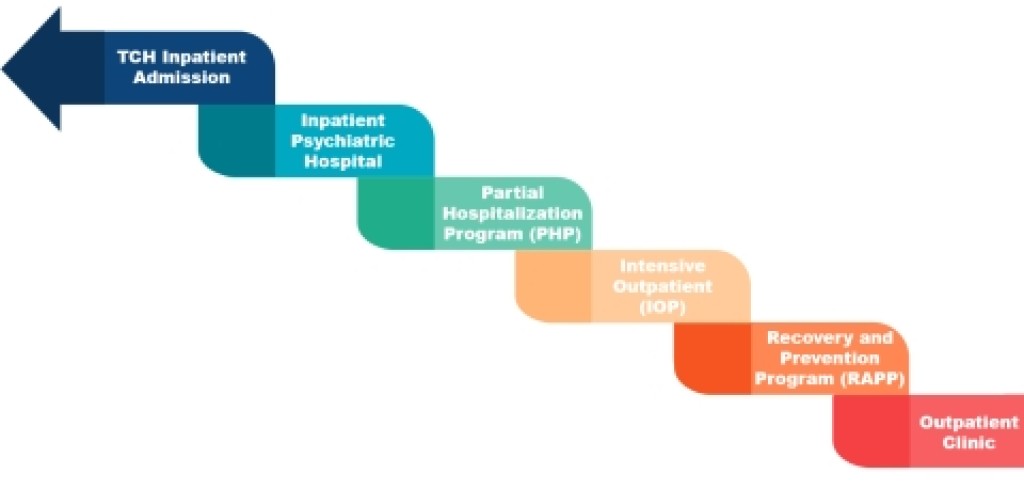
Adolescent Medicine
Eating Disorders Program
The Eating Disorders Program at Texas Children’s Hospital, established in 1986, provides interdisciplinary inpatient (including 24-hour on-call coverage) and outpatient care for adolescent and young adults with eating disorders. New patients ages 10-18 are considered for acceptance into the program after review of their clinical information by our intake team. The program also trains future doctors and psychologists in clinical management of eating disorders.
To support and manage the health of patients, we provide outpatient and inpatient treatment, as determined by medical severity. Our health care professionals are committed to an interdisciplinary team approach with a focus on the patient's healthy development.
Our team of professionals treat the following eating disorders:
- Anorexia nervosa
- Bulimia nervosa
- Binge-eating disorders or compulsive overeating
- Unspecified feeding or eating disorders
- Other specified feeding or eating disorder
- Avoidant Restrictive Food Intake Disorder (ARFID)
Interdisciplinary clinical care involves development and participation in a medical and behavioral evidence-based approach to care. The team consists of five board-certified adolescent medicine physicians, each with three years of fellowship training in the inpatient and outpatient management of eating disorders; clinical psychologists; dieticians; nurses; patient care extenders; physical therapists; hospital, school and child life therapists; hospital chaplain; social workers; and child-adolescent psychiatry consultants.
The Eating Disorder Program at Texas Children’s Hospital is a member of the National Eating Disorder Quality Improvement Collaborative (NEDQIC).
Services
Interdisciplinary clinical care involves development and participation in a medical and behavioral evidence-based approach to care. Our team meets regularly to coordinate care for our adolescents. This close collaboration helps each patient receive the most individualized and comprehensive plan.
Continuum of care
Texas Children’s utilizes a comprehensive continuum of care (below) for the treatment of eating disorders to ensure patients are receiving the right care, in the right place at the right time as they transition to a place of stability and healthy eating habits. Patients are followed in Texas Children’s outpatient programs for continued support and ongoing monitoring, as our clinical team knows that eating disorder behaviors involve complex medical and behavioral health components and patients often do not follow a straight path to recovery. If more intensive therapy is needed, patients are transferred to the appropriate care level, either internally at Texas Children’s or to an external community site, to receive the necessary level of care before they are ready to transition back to routine outpatient visits for monitoring and support. Texas Children’s has relationships with many sites throughout the Houston area and can make referrals based on the needs of the individual patient.

Outpatient treatment
We offer a full team of professionals to help address all aspects of healthy living. Outpatient treatment includes:
- Medical visits as often as determined necessary by the physician.
- Dietitian support for individualized meal planning and nutritional balance.
- Individual and family therapy for psychological and behavioral intervention to address eating concerns, body image and self-esteem concerns, as well as other presenting difficulties with depression or anxiety. Therapists may also assist with family communication, helping the family to establish a healthy support system, and educating parents and family members about eating disorders.
Inpatient treatment
Inpatient treatment involves medical hospitalization to treat severe malnutrition and medical complications of eating disorders. This program includes:
- Daily monitoring from medical professionals and dietitians.
- Support from a team of psychologists focused on individual and family well-being and the transition from hospital to home.
- Group therapy three times per week and focusing on coping strategies, distress tolerance, mindfulness and psychoeducation.
- Individual therapy is two to three times per week, family therapy once a week, and group therapy three times per week.
- Hospital school (Monday through Friday).
- Monitored physical activity (stretching, strength training and cardiovascular exercise) within our Wellness Center (once medically stable).
- Child Life therapy, including music therapy twice per week.
- Hospital chaplain services.
Explore more

